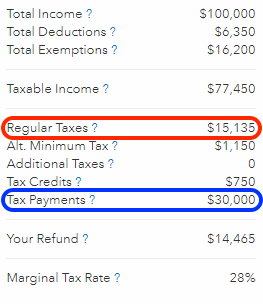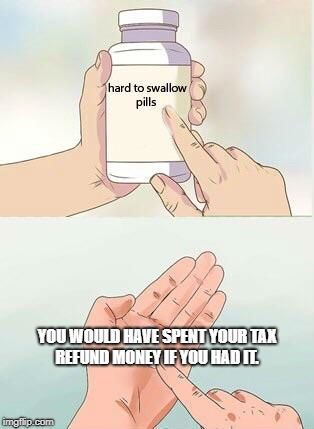Ah, springtime. The birds are singing. Love is in the air. And the weather’s getting warmer. You know what that means!!
That’s right: It’s tax season, friends.
I LOVE tax time. Mostly because I get to laugh at all the financial “experts” who opportunistically awake from hibernating all winter — when your pal Ramit is here ALL YEAR.
It’s also when some of us get a chunk of cash back from the government through tax refunds.
How much are YOU going to get back though? Well, the average tax refund is about $3,046 (per The Washington Post). So expect around three grand for your tax refund.
But “average” doesn’t mean “guaranteed.” There’s nothing worse than planning for a refund and … getting nothing. Or worse, OWING money. That’s why I want to break that number down, show you how that refund is calculated, and tell you something that a LOT of people (e.g., the “experts”) get wrong about your tax refund.
- How much do I get back in taxes?
- How do I get my tax refund?
- What people get wrong about tax refunds
- Master your finances
How much do I get back in taxes?
To understand how much you get back in taxes, you need a quick lesson in withholdings.
Now you’ve probably noticed that a large portion of your income is “missing” from your paycheck each month. Part of the reason it’s missing (aside from 401ks, insurance, etc.) is because the government is “withholding” your pay based on how you filled out IRS form W4. This form determines how much you and your employer agree to withhold for taxes.
To get a rough estimate of how much you’ll get back, then, you need to:
- Find your total income tax owed for the year (I suggest using this tax calculator for a rough estimate).
- See if that’s more or less than what you’ve had withheld (look on your end-of-year W2 form).
This is a very simple breakdown of how tax refunds are calculated and doesn’t take into account things like tax deductions, exemptions, and benefits claimed throughout the year. But it can give you a rough idea of how much you might get back from the IRS come tax season.
Let’s take a look at this using two more VERY simplistic examples.
John / 30 / $75,000 / No kids
John is a single 30-year-old with no dependents. Last year, he made $75,000, withheld $15,000, and collected no government benefits.
Check out how much he could get for his 2017 tax refunds (using the calculator above).

Subtract the red circle from the blue for the refund.
$3,105. Just about the average for tax refunds! AND with the new tax laws, he stands to get even more in his refunds in 2018 (about $5,195).
How about someone who’s married with children?
Margaret / 45 / $100,000 / Three kids
Margaret is a married 45-year-old with three kids under the age of 17. Last year, she made $100,000 and withheld $30,000 in taxes. She’s ALSO the head of her household and collected no government benefits.
How much does she stand to get back?

Subtract the red circle from the blue for the refund.
Uncle Sam might owe Margaret $14,465 when all is said and done. And if her situation doesn’t change in 2018, her refund will actually grow to $20,584.
NOTE: Everyone’s tax situation is unique and any online tax refund calculator will, at best, provide you with a rough estimate of how much you’ll get back. The two examples above are incredibly simple and don’t fully capture the nuances of someone’s actual financial situation.
Play around with them and be as specific as you can. The more details you can provide the better of an idea you’ll have of what you’ll receive for your refund.
So now you know roughly how much you’ll be getting back and you’re ready to collect the money Uncle Sam owes you. (Or, if you didn’t withhold enough, how much you owe.)
Before you hoist your “Don’t tread on me” flag and march down to the IRS building to get your money, you should know about all the ways you can get your tax refund.
How do I get my tax refund?
Luckily for you, the IRS is very good about getting your tax refund to you.
In fact, you can check out the IRS’s “Where’s my refund?” tool to find the status of your tax refund right now. And according to the IRS, they issue nine out of ten refunds back to the taxpayer within 21 days after they file their taxes.
Ultimately, though, how soon you get your refund back depends on two things:
- How you file your taxes
- How you elect to receive your refund
If you decide to file your taxes through good old fashioned pen and paper, it’s going to take considerably longer to get your refund back. In fact, you’re going to have to wait four to six weeks before you’re even able to check your status on their “Where’s my refund?” tool.
There is another route though: Electronic tax filings.
You receive your tax refund even faster when you file it electronically via platforms like TurboTax or IRS e-file. There you can elect to receive your refund through direct deposit (a free service provided by the IRS). It’s secure, fast, and the same way the government deposits millions of Social Security and Veteran Affairs benefits each year.
When you get your money back, be sure to put it to good use:
So you know how much you’re getting back and how to get your money. Now let’s get into what you might be getting WRONG about your tax refund.
What people get wrong about tax refunds
I have a confession to make: I actually love the kooky weirdo financial “experts” you see on TV or on their online soapbox who lecture you about taxes. Because 99.99% of the time they are DEAD WRONG about money.
One of their favorite go-to buzz phrases:
“If you’re getting a tax refund, you’re giving the government free money!”
TRANSLATION: If you get a refund, that means the government took your money and earned interest on it for an entire year!!
Then these “experts” are typically out of breath because of their own brilliance.
Let me break this down for you.
The average tax refund is about $3,000. Let’s assume that money would have been sitting in a savings account with a 1.45% APY (that’s on the higher end for savings accounts).
How much interest did you lose through your tax withholdings? $3.62 a month.
OMG!! The government is stealing the equivalent of a latte each month! Time to dump a bunch of tea in Boston Harbor.
Here’s a hard truth: If you had that money, you probably would have spent it. That’s not a slight against you — that’s just human psychology. We as humans have an incredibly finite amount of willpower. That’s why cost-saving measures like cutting out lattes or lunch at your favorite sandwich spot aren’t realistic.

And yes, technically, they’re right. You could have been earning interest on the money. I live in a world of reality, however, which means that “technically” isn’t always correct.
So in all there are two reasons I’d rather get a tax refund than owe the government money:
- If people end up owing the government money at tax time, most won’t have extra cash lying around. We know this because they are terrible at managing their money and have record debt rates. Sorry, it has to be said.
- As stated before, the interest they stand to earn is incredibly low. If you’re worried about saving a few dollars each month, then I highly suggest you go find another blog.
So ignore the kooky weirdos out there and learn what you should REALLY do with your money:
Master your finances
Remember: When it comes to your personal finances, worry about the things you can control.
Instead of thinking about the “what ifs” and how much the government is supposedly earning off of your money, make sure your personal finance house is in order so you can maximize the earnings of what you have.
My team and I worked hard on something to help you do just that:
In it, you’ll learn how to:
- Master your 401k: Take advantage of free money offered to you by your company … and get rich while doing it.
- Manage Roth IRAs: Start saving for retirement in a worthwhile long-term investment account.
- Spend the money you have — guilt-free: By leveraging the systems in this book, you’ll learn exactly how you’ll be able to save money to spend without the guilt.
Enter your info below and get on your way to living a Rich Life today.
Get your tax refund: How much do I get back in taxes? is a post from: I Will Teach You To Be Rich.
No comments:
Post a Comment